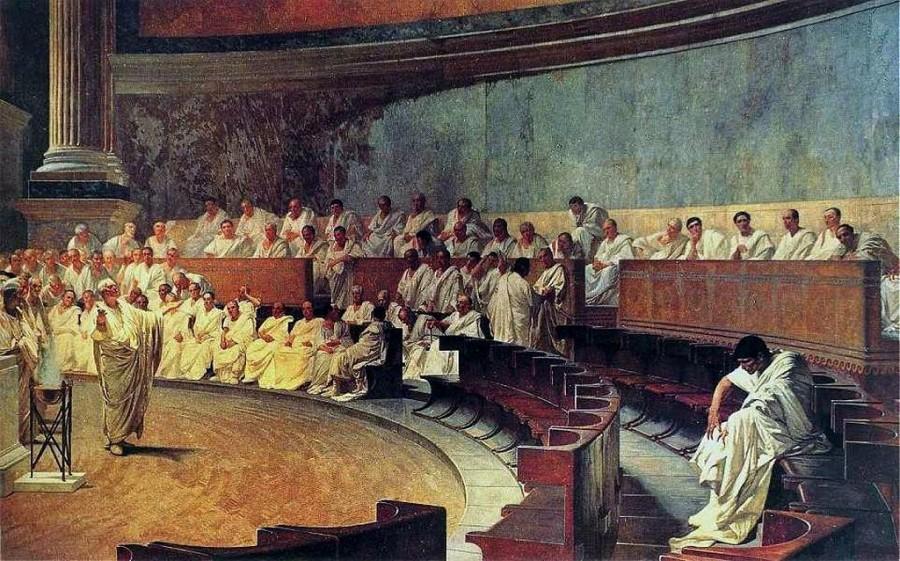Bringing strategy games to life at YMUN 2015
I can testify first-hand that the Graded trip to Yale for the 2015 Model United Nations conference was an all-around great experience. However, when it comes to my own experience, the committee that I took part in at the conference was entirely unique and fascinating. The “Empire Eterna” committee was successful in blurring the lines between a model UN committee and a real-time, life-like, historical strategy simulation.
Created as a pet project by two Yale roommates, Jacob Wasserman and Myron Zhang, the Empire Eterna committee simulates an alternative history in which the Roman Empire never fell. Each delegate represents a powerful political player from the Roman senate. The concept of this committee is to put the Roman government under stress and see if the delegates could actually rectify it and prevent the fall of Rome. That being said, the power is in the hands of the delegates. The committee can be peaceful and diplomatic, if the delegates chose to work that way, or there could be war, betrayal, chaos, and death, like there was in my committee.
In our scenario, set in 635 A.D, the Emperor of Rome had just been assassinated. The pope was attempting to appoint a religious official as the next emperor, a worrying scenario for any secular official trying to avoid a theocracy. Our delegation was called to investigate the death of the emperor and find a fair way to appoint a new pope. Seems easy enough, right? Not really.
After a few hours of committee sessions, we had formed a comprehensive plan to appoint a new emperor democratically and launch an investigation into the emperor’s death. All was going smoothly until the empress (played by Jacob Wasserman, our chair, in full costume) barged in on our committee and passionately accused the seven most powerful military chiefs in western Europe of murdering the emperor. The challenge had been presented.
The punishment for high treason was death. So, what were the accused to do? Would they wait and hope to be given a fair trial by the rest of the committee? Or would they combine their military forces and segregate from the Roman Empire, thus establishing another empire in modern-day Spain, Portugal, France, Switzerland, Germany, Belgium, and Luxembourg? Well, interestingly enough, they showed faith in their fellow delegates and decided not to separate from the Empire. Poor choice. The problem was that meanwhile, in the committee room that the accused were absent from, a Game-of-Thrones-type trial by combat had been decided upon.
When the verdict on the trial-by-combat was made, both the accused and the committee were to select champions to battle. The two chairs were selected as the champions and, like something out of a movie, they picked up wooden swords and started fighting. The champion of the accused was defeated and thus the seven commanders were sentenced to death. It was at this point that they decided to declare war upon the entire committee for providing them with an unfair trial.
The room was split between those who were going to the West and those staying in the East. However, as more alliances were made, and as more negotiations took place, the room divided again and again. There were five factions, then there were three, four, and finally there were two. The empire ended up being split between North and South. Europe and Africa. A war broke out. The next eight hours were spent battling; troops from each coalition were sent across the continents to fight. Delegates would issue orders for how their troops were to move. Battles were simulated by a computer. An interactive map projected on the wall showed us the territory being lost and gained. However, the war was dead even. So the chairs decided to mix things up, and added Vikings and Persians.
Vikings were marauding the northwestern portions of Europe; the Persian empire was conquering Africa and the Middle East at the same time. Crisis once again presented itself. However, in every crisis lies an opportunity: to unite the empire against the invaders. Quite a fairy-tale ending, right? However, we, being the stubborn and belligerent delegates that we all were,decided to ally with the invaders. The Vikings joined the North and the Persians joined the South. With no hopes in sight, the chairs then decided to give us one more chance to ally and bring peace to Rome. They spread a plague and brought in peasants from across the empire, begging us to make peace.
As true warmongers, we foolishly ignored the pleas of the people and continued the war. We had mercilessly doomed Rome. The experiment had concluded. Rome was divided and lost forever. The moral is that Empire Eterna is truly nothing more than a hopeful illusion, a question to ask yourself in moments of boredom. What if Rome never fell? What if the dark ages never occurred? As we proved this year at Yale, the fact of the matter is that Rome must have eventually fallen. Like all great empires, it couldn’t last for eternity.

Nicholas Householder, who goes by “Nick,” is embarking on his first year at The Talon where he will be working as a Features writer. He can sometimes...









